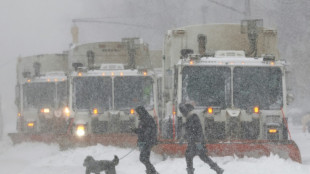

Central Europe swelters as heatwave moves east
A punishing heatwave loosened its gripped on western Europe Wednesday and rolled eastwards, with Germany expected to record some of its hottest temperatures of the year so far.
Germany's national weather service (DWD) issued blanket weather warnings for heat and extreme heat covering the entire country.
The agency said it expected "maximum temperatures with exceptionally high peaks of up to 40 degrees Celsius (104 degrees Farenheit)" in the course of the day.
The unsually hot weather was causing disruptions to transport, with the national rail operator Deutsche Bahn saying it expected services to be affected in the west of the country where temperatures were rising most.
In the north of the country, the heat had caused the surface of the motorway to buckle in places, creating a danger for drivers, local media reported.
In Berlin, 18-year-old Nora said her job at a kiosk selling strawberries was "a bit like a sauna", with the temperature already at 26C at 8:30 am.
"I've never sold strawberries in this sort of heat," she said, adding that her employer had told her to shut the kiosk if she felt unwell.
Further south in Frankfurt teacher Horst Hirsch said he expected "to work and to sweat" in a day full of lessons and meetings and planned to "not do any exercise and drink lots of water".
In France, the temperature gauge hit 40C in Paris on Tuesday, according to weather service Meteo-France, with a lower high of 35C expected Wednesday.
Relief will reach the French capital in earnest on Thursday, when the high will drop to 28C as cooler winds blow in from the Atlantic, bringing with them the potential for thunderstorms.
- 'Really unbearable' -
Meanwhile, residents in Spain and Italy may have to wait until the weekend before they experience a drop in temperatures.
Care worker Grace Guerrero, 65, told AFP she could really "feel the heat" in Madrid but the air was cooler at her home outside the Spanish capital.
The sweltering temperatures were "really unbearable on the subway platform", 60-year-old quality manager Julia Munoz said while cooling herself with a fan.
In Belgium, lower temperatures were expected on the coast while the heatwave was set to continue in the east and south.
The Atomium attraction in Brussels, where highs of 34C were expected, would maintain reduced opening hours for the second day in a row on Wednesday to spare visitors from the afternoon heat.
In the country's Dutch-speaking north, students have already broken up for the summer, but in the French-speaking south schools have stayed open through the heatwave.
Staff at the schools were working to keep children cool using fans and air-conditioning where available, water play, outdoor breaks in the shade, or in some cases giving parents the option to keep them home.
The heatwave saw class cancelled for pupils at some 2,000 schools in France on Tuesday, although only around 135 were expected to stay shut Wednesday, according to the education ministry.
- 'Tropical' -
In the Netherlands, the country experienced its first "tropical" night of the year into Wednesday with temperatures not dropping below 20C, according to the weather website Weeronline.
A shepherd in the central Netherlands told local media Omroep Gelderland that he was up unusually early to let his sheep out on Wednesday morning after the muggy night.
"Animals tolerate the cold better than the heat... you have to be careful," the livestock holder Aart said, noting that his flock kept their coats through the heat.
"Without the fleece, they would, for example, get sunburned much faster," he said.
High temperatures were a stress for people, too, prompting authorities to issue warnings for the very old, young, the sick and other vulnerable groups.
"Due to climate change caused by humans, extreme heat is becoming more frequent and intense. This is something we must learn to live with," said Clare Nullis, spokesperson for the World Meteorological Organization (WMO), a UN agency based in Geneva.
Extreme heat can cause dehydration, muscle cramps, headaches and nausea. The most serious risk is heatstroke, which can lead to death.
burs-sea/jsk/phz
C.Karamanos--AN-GR


